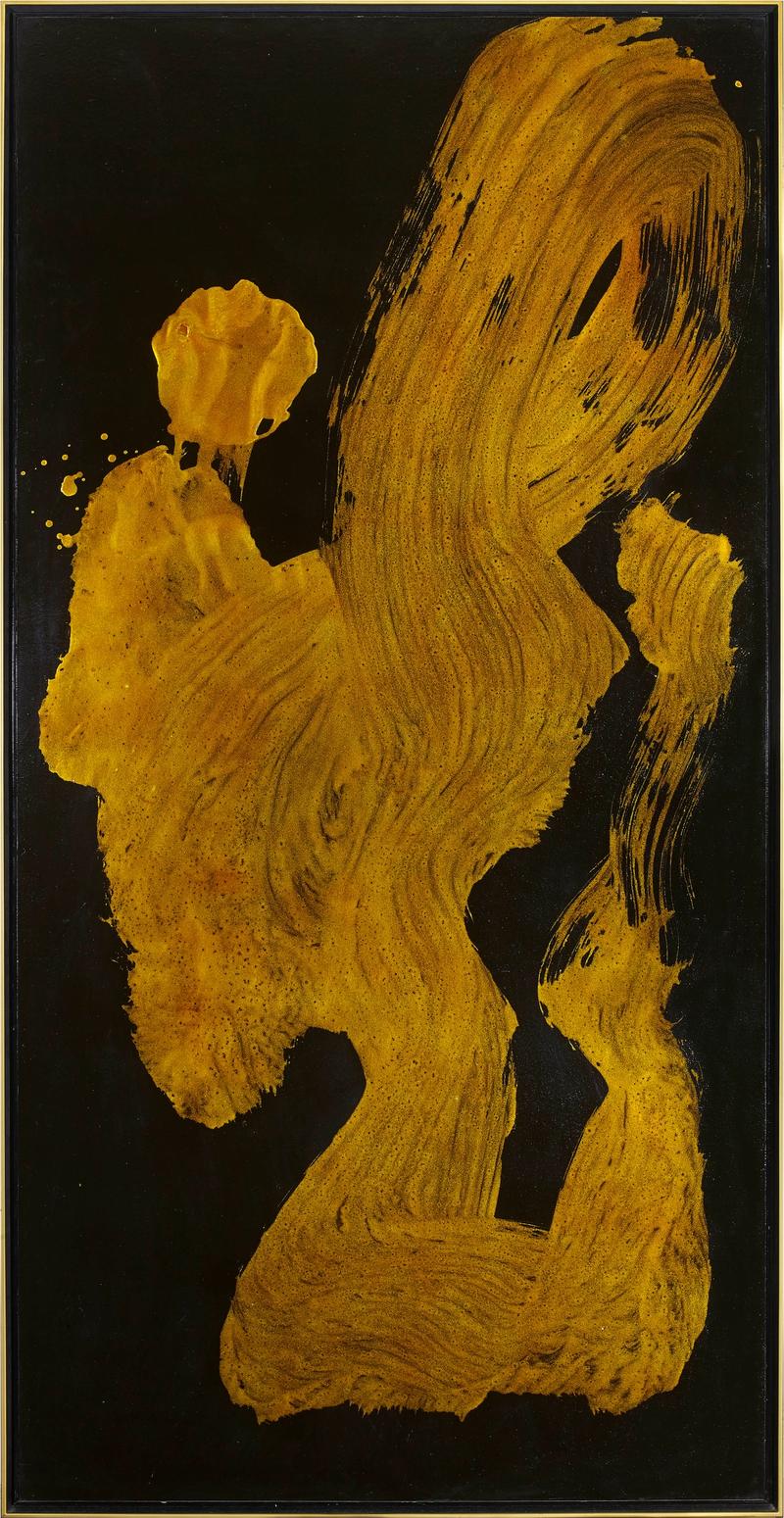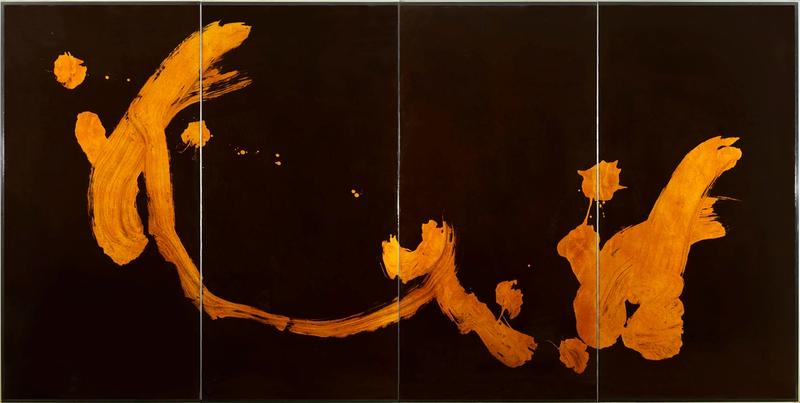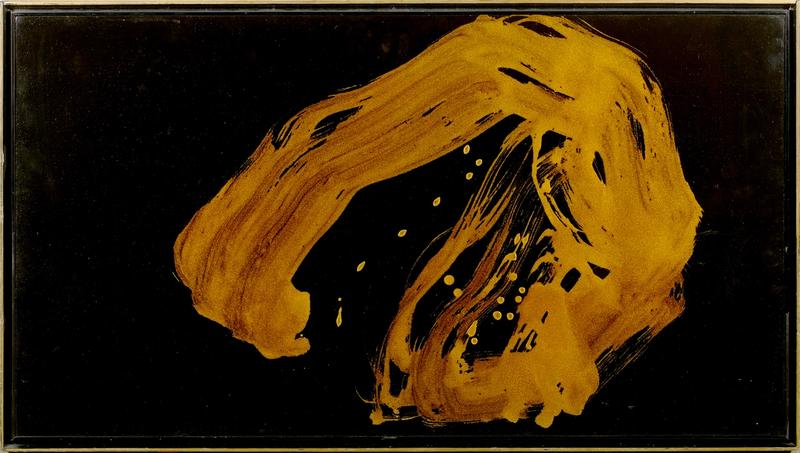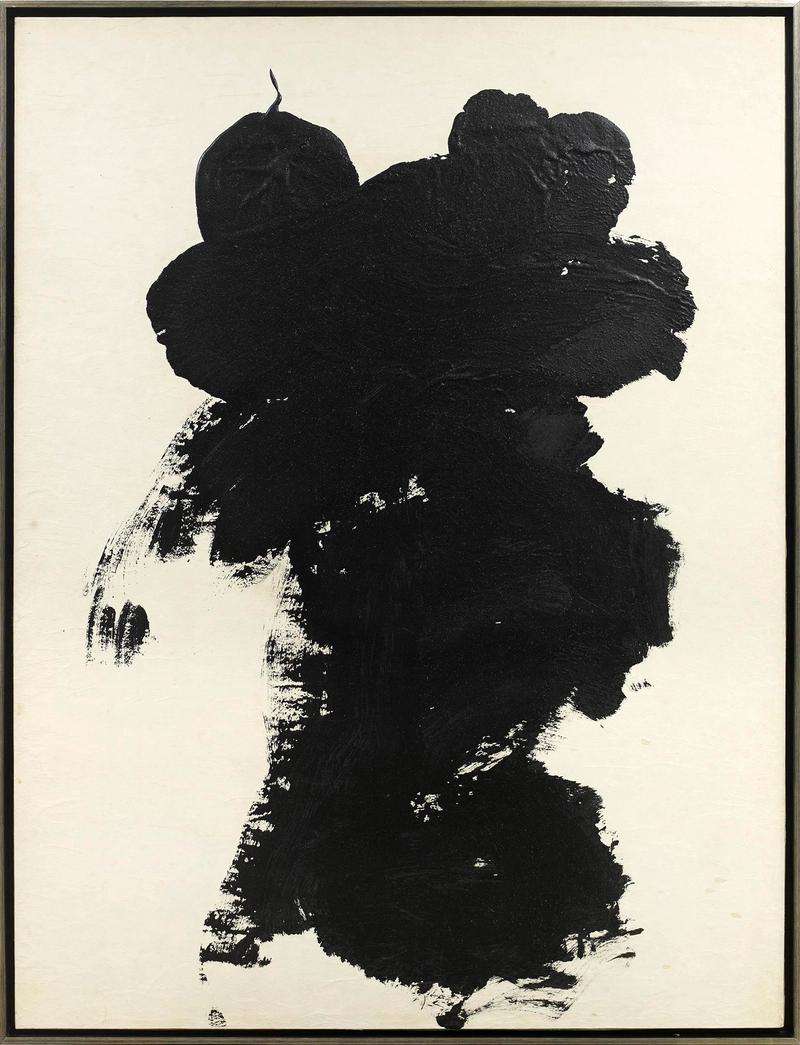Morita Shiryu
1912 to 1998
Japan

Biography
Morita Shiryū was born in Toyooka, Hyogo Prefecture and studied sho (calligraphy) under the influential and ground-breaking calligrapher Ueda Sōkyū (1899-1968). Sōkyū was a charismatic teacher introducing his talented pupils to avant-garde sho and its definition as the art of the line.
Having received numerous awards from important Japanese exhibitions such as the 1937 Inten (Japan Art Institute Exhibition) where he won the Tokusen silver award, Morita became more and more fascinated with the performance involved in the writing of sho and the similarities between the expressive calligraphic line and what was developing within the Abstract Expressionist art scene of the West. In 1948 he launched the magazine Shonobi (beauty of calligraphy) under the leadership of his master Ueda Sōkyū with the intention of promoting avant-garde sho.
The notion of abstraction had been part of the practice of East Asian calligraphy for many centuries, and Morita often wrote about the interplay between traditional Japanese calligraphy and abstract art in the West. These observations were catalogued in a second journal entitled Bokubi which was first edited and published by Morita in 1951 and featured an image of a calligraphic painting by Franz Kline on its cover. Distributed internationally, the journal became extremely influential within the Western art world, causing a further interest in the Japanese aesthetic followed by an array of collaborations and international exhibitions with European artists of the Abstract Expressionist movement such as Pierre Alechinsky (b.1927) and Georges Mathieu (1921-1912), and American artists Mark Tobey (1890-1976) and Franz Kline (1910-1962). With the help of such innovative publications and the possibility of international exposure, modern Japanese calligraphers such as Morita and fellow like-minded artist Inoue Yūichi soon became an international sensation.
In 1952, five disciples of Ueda Sōkyū including Morita co-founded the legendary Bokujinkai (Society of Ink People). He joined forces with Inoue Yūichi (1916-1985), Eguchi Sōgen (1919-), Sekiya Yoshimichi (b.1920) and Nakamura Bokushi (dates unknown) and together they further advocated the emancipation of the calligraphic line away from its traditional form and experimented using unorthodox materials. The beauty of the line itself is held as a self-evident attribute and the execution of the writing becomes the focus. Morita placed the performance of a piece at the centre of his definition of calligraphy. The kanji character is written in one defining moment with confident strokes. The calligrapher penetrates to a deeper level of understanding and the character is understood in a different, more profound way.
In terms of style and format, Morita Shiryū’s works are groundbreaking. He preferred to use an oversized brush, working quickly across the surface. Whilst works such as the example presented here may appear to be executed using the rather slow process of Japanese lacquer, in actuality the metallic silver paint is applied swiftly onto the surface and later covered with a coat of fast drying yellow varnish achieving a similar effect. Morita’s vigorous style often results in abstract forms which no longer appear to be recognisable characters yet they retain their original essence enhanced with a new vitality.
Works by the artist can be found in the collections of: The Art Institute of Chicago; St. Louis Art Museum, Missouri; Cincinnati Art Museum, Ohio; Freer Sackler Gallery, Washington DC; Minneapolis Institute of Art, Minneapolis; M+, Hong Kong; The National Museum of Modern Art, Kyoto; The National Museum of Art, Osaka; Hyogo Prefectural Museum of Art, Hyogo; Tokyo Metropolitan Art Museum; Kyoto Municipal Museum of Art.
Selected solo exhibitions:
1963 Sho Modern Calligraphy, Mi Chou Gallery, New York
1964 Yamada Gallery, Kyoto
1965 Olaf Hudtwalcker Gallery, Frankfurt
1970 - 1990 Morita Shiryū, National Gallery of Canada, Ottawa (exhibition toured the world)
1986 Morita Shiryū , Kyoto Munincipal Museum of Art, Kyoto
1990 Ein Japanischer Schreibmeister, Klingspor-Museum, Offenbach am Main, Germany
1992 Shiryu Morita and Bokubi, Hyogo Prefectural Museum of Modern Art, Kobe
1994 Morita Shiryu ten: Yakudo suru inochi no Katachi, Hyogo Prefectural Maruyamagawa Kouen Museum, Toyooka
2013 Modernist Sho Calligraphy – Paintings by Shiryū Morita, John Molloy Gallery, New York
Selected group exhibitions:
1937 2nd Inten Exhibition, Tokyo – Tokusen silver Award
1938 Nichiman Calligraphy Exhibition, Tokyo - Ministry of Education Award
1953 Japanese Architecture and Calligraphy, Museum of Modern Art, New York
1954 Japanese and American abstraction, National Museum of Modern Art, Tokyo
Abstract Japanese Calligraphy, Museum of Modern Art, New York
1958 Carnegie International Exhibitions, Pittsburgh
Modern Abstract Japanese Calligraphy, The Museum of Modern Art, New York
Abstract Painting Exhibition, National Museum of Modern Art, Tokyo
1959 São Paulo Art Biennial, São Paulo
1960 Japanese calligraphy, Freiburg, Germany
1961 São Paulo Art Biennial, São Paulo
Carnegie International Exhibitions, Pittsburgh
1962 Contemporary Japanese Plastic Arts, Tokyo National Museum of Modern Art, Tokyo
1963 Tendency of Contemporary Japanese Painting, National Museum of Modern Art, Sydney
Modern Trends, National Museum of Modern Art, Kyoto
1964 Contemporary Japanese Painting, Corcoran Gallery of Art, Washington, D.C.
1966 Japanese Art Today, Philadelphia Museum of Art, Philadelphia
1992 Calligraphy and Painting: The Passionate Age: 1945-1969, O Art Museum, Tokyo
1994 Japanese Art After 1945: Scream Against the Sky, Yokohama Museum of Art, Yokohama and Guggenheim SoHo, New York
1995 Japanese Culture: The Fifty Postwar Years, Meguro Museum of Art, Tokyo, Tokyo
1995 Invitation to Abstract Art, The National Museum of Art, Osaka
1998 Aspects of Line, The National Museum of Art, Osaka
2002 Writepainting: Marks in a Japanese Vein, Museum of Fine Arts, Gifu
2007 The 30th Anniversary: Collection of the National Museum of Art, Osaka, The National Museum of Art, Osaka
2013 Genbi New era for creations -- Gendaibijutsukondankai no Kiseki 1952-1957, Ashiya city Museum of Art and History, Hyogo
2017 Pierre Alechinsky, The National Museum of Art, Osaka
2020 Collection: The Aesthetics of Contemporary Japan, The National Museum of Art, Osaka
2024 Pierre Soulages and Morita Shiryu, Hyogo Prefectural Museum of Art, Hyogo









